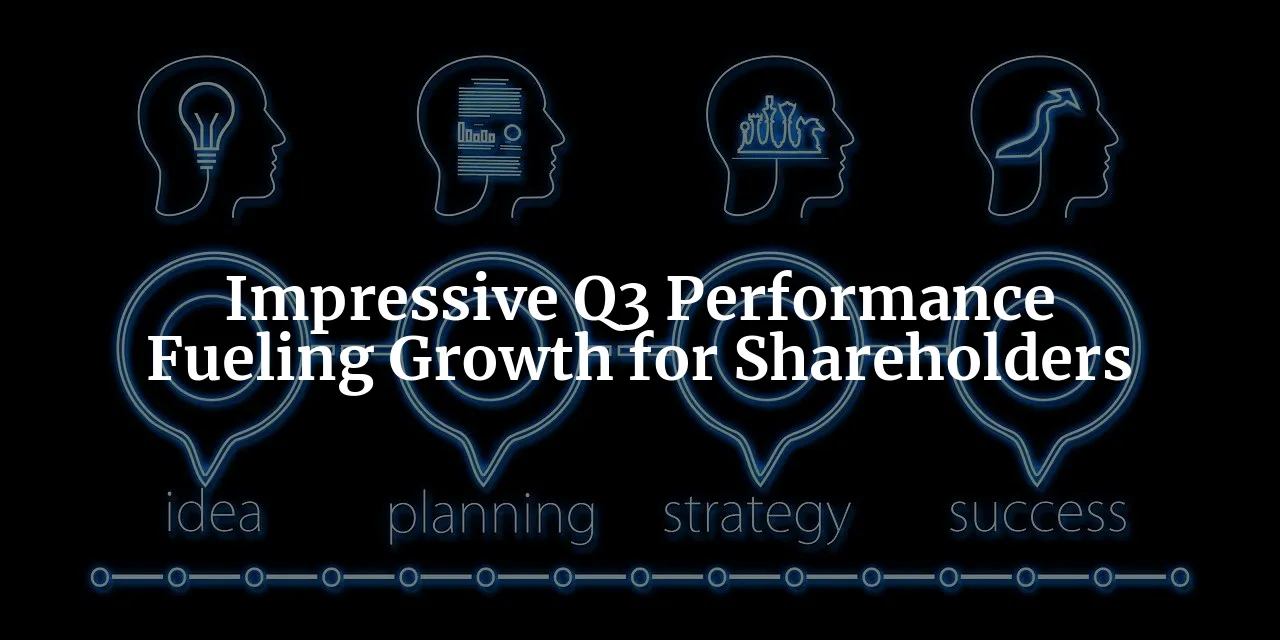Tags: Earnings / Pilot
This fanpage is not officially affiliated with Berkshire Hathaway: Disclaimer
Attention Berkshire Hathaway shareholders! Get ready to dive into the exciting world of Pilot Flying J and discover their impressive performance in Q3 2023. Despite challenging market conditions, Pilot Flying J has soared with revenues of $13.2 billion and pre-tax earnings of $291 million. With a diverse range of operations, strategic growth, and strong financial management, Pilot Flying J is set to deliver value and fuel growth for Berkshire Hathaway shareholders. Don't miss out on this thrilling journey of success and profitability!

Introduction
As we navigate the financial landscape of 2023, it's essential to understand the performance of key players within our investment portfolio. One such player is Pilot Travel Centers LLC, doing business as Pilot Flying J, a leading North American chain of truck stops. Based in Knoxville, Tennessee, Pilot Flying J operates over 750 locations across 44 states and six Canadian provinces, making it a significant player in the truck stop industry 1.
For Berkshire Hathaway shareholders, the performance of Pilot Flying J is of particular importance. As of January 31, 2023, Berkshire Hathaway acquired an additional 41.4% interest in Pilot Travel Centers, resulting in an 80% controlling interest 1. This significant stake in the company underscores the importance of understanding Pilot Flying J's Q3 2023 results and its overall performance in the market.
The Q3 2023 results provide a snapshot of Pilot Flying J's financial health, its ability to navigate market challenges, and its potential for growth. Despite a challenging market environment, Pilot Flying J's revenues for the third quarter of 2023 were $13.2 billion, with pre-tax earnings of $291 million 1. These figures demonstrate the company's resilience and profitability, even amidst headwinds.
The Rise of Pilot Flying J: From Humble Beginnings to Industry Leader
The story of Pilot Flying J is one of strategic growth and industry leadership. The company's journey began in 1981 when Pilot Corporation opened its first truck stop 2. From these humble beginnings, Pilot Corporation embarked on a path of growth and expansion that would see it become a dominant player in the truck stop industry.
In 1993, Pilot entered a joint venture with Marathon Petroleum Company, resulting in the rebranding of all Pilot Truck Stops to Pilot Travel Centers 2. This move marked a significant step in Pilot's expansion strategy, positioning the company to take advantage of the growing demand for travel centers in North America.
Pilot's growth strategy didn't stop there. Over the years, the company pursued a series of acquisitions, including the conversion of Speedway truck stops and the acquisition of the Williams Truck Stop chain 2. These strategic moves allowed Pilot to rapidly expand its footprint and establish a strong presence in the market.
Overview of Pilot Flying J's Operations
Pilot Flying J's operations are extensive and diverse. With over 750 locations across North America, the company has a broad network that serves millions of customers each year 2. These locations operate under various brands, including Pilot Travel Centers, Flying J Travel Plaza, ONE9 Fuel Network, and Mr. Fuel, offering customers a wide range of services and amenities.
In addition to its travel centers, Pilot Flying J has also expanded into fuel marketing platforms and wholesale fuel operations in the U.S 1. These operations have allowed the company to diversify its revenue streams and capitalize on the growing demand for fuel-related products.
Pilot Flying J's operations are not just about providing services to travelers. The company is also the third-largest franchiser of quick-service restaurants in the nation, including brands like Arby's, Dairy Queen, Denny's, Hardee's, McDonald's, Pizza Hut, Subway, Taco Bell, Wendy's, and Cinnabon 2. This diversification strategy has enhanced the customer experience at Pilot Flying J locations and contributed to the company's strong financial performance.
Key Financial Highlights of Q3 2023
Despite a challenging market environment, Pilot Flying J's financial performance in Q3 2023 was robust. The company posted revenues of $13.2 billion, showcasing its resilience and ability to generate revenue even amidst market headwinds 1.
Pre-tax earnings for the third quarter of 2023 were $291 million, demonstrating the company's profitability 1. While these earnings were undoubtedly impacted by market challenges, they also highlight Pilot Flying J's ability to maintain profitability in a difficult market environment.
Operating and other expenses for the third quarter of 2023 included a significant depreciation and amortization expense of $250 million 1. While this expense is substantial, it is a necessary part of doing business and reflects the company's ongoing investment in its operations and infrastructure.
Fuel Sales and Market Performance
Fuel sales are a critical component of Pilot Flying J's business. In the first nine months of 2023, the company sold approximately 12.2 billion gallons of fuel-related products, compared to 13.6 billion gallons in 2022 1. This decrease in sales is likely a reflection of broader market trends and challenges.
Despite this decrease in sales, Pilot Flying J remains the largest purveyor of over-the-road diesel fuel in the United States 2. This position underscores the company's dominant position in the market and its ability to maintain market share, even amidst challenging conditions.
The cost of sales in 2022 included significantly higher LIFO inventory charges than in 2023 1. This reduction in inventory charges has likely contributed to the company's strong financial performance in 2023, helping to offset the impact of lower fuel sales.

Interest Expense and Financial Management
Interest expense is a critical aspect of financial management for any company. For Pilot Flying J, interest expense increased by $51 million in the third quarter and $166 million in the first nine months of 2023 compared to 2022 1. This increase reflects the company's ongoing investment in its operations and growth strategy.
While increased interest expense can put pressure on a company's profitability, it can also be a sign of strategic investment and growth. For Pilot Flying J, the increased interest expense likely reflects the company's ongoing investment in its operations, infrastructure, and growth initiatives.
Managing interest expense is a critical aspect of financial management. For Pilot Flying J, this involves a careful balance between investing in growth and managing costs. The company's ability to navigate this balance will be critical to its long-term success and profitability.
Competitive Landscape and Partnerships
The truck stop industry is highly competitive, with several major players vying for market share. Pilot Flying J's main competitors include Love's Travel Stops, Travel Centers of America, Stuckey's, Roady's Truck Stops, and T/A-owned Petro Stopping Centers 2.
Despite this competitive landscape, Pilot Flying J has maintained a strong position in the market, thanks in part to its strategic partnerships. The company has partnerships with Road Ranger and Town Pump and purchased a controlling stake in Mr. Fuel in 2014 2.
In addition to these partnerships, Pilot Flying J also operates a range of quick-service restaurants at its locations. This strategy enhances the customer experience at Pilot Flying J locations and provides an additional revenue stream for the company.
Notable Events and Challenges
Like any company, Pilot Flying J has faced its share of challenges and notable events. In 2013, the company's headquarters was raided by FBI and IRS agents as part of an investigation into failure to pay rebates to trucking customers 2. The company subsequently settled with several trucking companies over allegations of fuel rebate fraud, paying restitution to customers and a $92 million penalty 2.
In July 2022, a jewelry heist occurred at a Flying J truck stop in California, where thieves stole jewels worth an estimated $10 million to $100 million 2. This event, while unfortunate, is a reminder of the risks associated with operating a large network of travel centers.
Despite these challenges, Pilot Flying J has also had notable successes. The company has had sponsorships in NASCAR and country music, including a partnership with JR Motorsports and a sponsorship of the "Battle at Bristol" at Bristol Motor Speedway 2. These sponsorships have helped to increase the visibility of the Pilot Flying J brand and engage with a broad audience of potential customers.
Conclusion: Delivering Value to Berkshire Hathaway Shareholders
In conclusion, Pilot Flying J's Q3 2023 performance demonstrates the company's resilience and ability to navigate market challenges ↗ ↗. Despite headwinds, the company posted robust revenues and maintained profitability, underscoring its strength in a challenging market environment.
For Berkshire Hathaway shareholders, Pilot Flying J's performance provides reassurance of the company's ability to deliver value ↗. The company's strategic growth, diverse operations, and strong financial performance position it well for continued success in the future.
Looking ahead, Pilot Flying J's ability to navigate market challenges, invest in growth, and deliver strong financial performance will be critical to its long-term success. For Berkshire Hathaway shareholders, this performance underscores the value of their investment in Pilot Flying J and the potential for continued growth and returns in the future.
References












